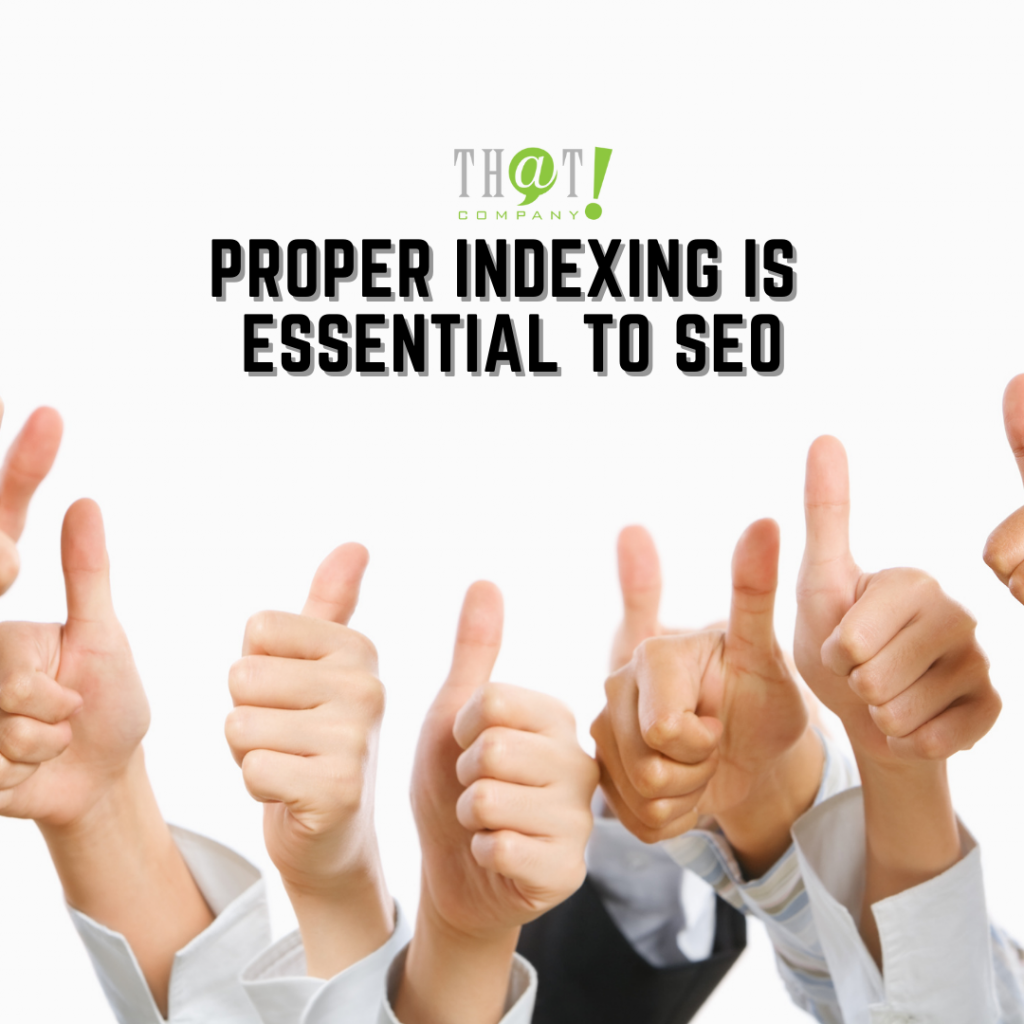
It’s no secret that Google has complete control over ranking sites in search results pages. If you can’t get indexed by Google, then you won’t show up for any searches. And if you can get indexed, but not in the way that Google wants, your site will get penalized. So it’s time to start paying attention to how Google indexes your site and know about proper indexing.
As a company for white label SEO services, we want to share with our audience the importance of indexing and its ramifications on SEO. Having a white label vs private label SEO service is a very real and useful relationship. We can be valued customers of our clients, but we can also provide a valuable service to them as well. The SEO industry has been built on the foundation of trust, but many people make mistakes when implementing their SEO campaigns.
Proper indexing is essential to SEO, and this article dives into why getting indexing wrong can hurt your traffic—and what you should do about it.
Indexing as a Ranking Signal
 Google has made it clear that indexing is considered a ranking signal. When you submit your site to Google’s index, Google crawls and indexes the content of your website and then matches that to search queries via an algorithm. The more frequently your website appears in search results for specific terms and phrases, the more likely Google will rank you higher for those terms or phrases. This means that you should focus on getting appropriately indexed so that users can find your site easily.
Google has made it clear that indexing is considered a ranking signal. When you submit your site to Google’s index, Google crawls and indexes the content of your website and then matches that to search queries via an algorithm. The more frequently your website appears in search results for specific terms and phrases, the more likely Google will rank you higher for those terms or phrases. This means that you should focus on getting appropriately indexed so that users can find your site easily.
The Spider vs. Crawling
When it comes to indexing, you might think that the crawler and the spider are the same things, but they aren’t. The crawler is a part of Googlebot, while Googlebot is a combination of several spiders. Essentially, Google uses different spiders to crawl other parts of your website. The crawler then uses that information to parse further and rank your site. If you want to pass SEO inspections, it’s essential to know which parts of your website are being indexed properly by Google so that you can streamline the process.
Why Indexing Is So Important for SEO
While indexing is a ranking signal, it isn’t one of Google’s top-ranking factors (you should focus more on your content and links). However, if Google doesn’t index portions of your website, you could miss out on traffic for those keywords. Let’s look at a few reasons why indexing is so essential for SEO:
- Google Won’t Rank Sites That Don’t Have Links
To rank on Google, you need backlinks from other websites that have high domain authority. While getting those links can be challenging, you can always create more content and make it available for users to link to. However, if your site isn’t indexed correctly and doesn’t show up in search results, no one will be able to reach your site and link to it. This means that you won’t get the necessary backlinks and won’t rank as easily.
- You Won’t Be Able to Rank for Pertinent Keywords
While creating content and linking to it is an excellent strategy for boosting your rankings, you can only rank as high as Google will index those pages. The more pages that you have indexed, the further your ranking potential will go. You can’t rank without being indexed, so indexing is a necessary first step to SEO success.
[bctt tweet=”Proper indexing is essential to SEO, and this article dives into why getting indexing wrong can hurt your traffic—and what you should do about it.” username=”ThatCompanycom”]- Google Crawls Different Sections of Your Website
If you think about it, Google has millions of individual spiders—each of which crawls a slightly different section of your website. While these sections may overlap somewhat, they still won’t be able to crawl everything on your site. That means that some parts of your site may not be indexed appropriately. This could have a negative impact on your rankings, so it’s essential to make sure that you have all of the necessary pages indexed.
- You Can’t Rank Without Being Indexed by Google
As mentioned above, indexing is a necessary part of SEO. Without being crawled and indexed by Google, you have no chance of being ranked by Google. This means that indexing is one of SEO’s most essential (if not THE most critical) parts. If you want to rank well on Google, make sure that your site is getting indexed properly.
- Your Site Won’t Get Indexed Properly If You Use a Bad URL Structure
Many SEO beginners make the mistake of using a bad URL structure on their site. With a bad URL structure, Google will often index the wrong pages or have trouble crawling certain sections of your website. This can have a significant impact on your rankings and search traffic, so it’s essential to use a good URL structure so that you can get proper indexing and rankings.
How to Get Proper Indexing for SEO Success
There are some easy ways to get proper indexing and rank higher in search results:

- Use a Good URL Structure
You must have a clear URL structure so that Google can crawl it easily. This means keeping your website in one place, using a proper URL structure, and ensuring that your pages are linked to in the right places. If you use a bad URL structure or have too many pages that Google doesn’t index, this will hurt your rankings. If you want to rank well with Google, make sure that all relevant pages are being indexed properly.
- Ensure That Pages Get Cached by Google
If you use a CMS, you can use cache plugins to help ensure that your pages get indexed. If Google doesn’t cache the pages, then they won’t get indexed. So make sure that your pages are getting cached properly so that you can prevent any future penalties.
- Use 301 Redirects
If you have moved your pages or are using a different URL structure, it’s essential to use 301 redirects to redirect the old URLs to the new ones seamlessly. This will prevent Google from getting confused about pages on your site and help you get proper indexing with minimal fuss.
- Make Sure That You Aren’t Linking to Wrong Pages in the Footer or Header
If you have links in your footer or header, they should all be pointing to relevant pages on your site—otherwise, they may not get indexed. Check them over carefully so that there are no mistakes and get proper indexing for SEO success.
- Use Complete, Unique URLs
While it isn’t necessary to use complete and unique URLs, it is one of the best performance options for SEO purposes. If you don’t want to use complete and unique URLs, make sure you mark your pages as “noindex” to prevent indexing issues. If you use complete and unique URLs without marking them “noindex,” then there is a chance that Google will index them—which could hurt your rankings and potentially lead to penalty problems down the road.
- Use the Right Robots Meta Tag on Your Pages
The robot’s meta tag is a helpful tool that you can use to control how a page gets crawled and indexed by Google. If you want to rank well with Google, ensure that the robot’s meta tag is set correctly on all of your pages—otherwise, they may not get indexed properly.
- Use an XML Sitemap for Free Indexing
If you have a Google sitemap, it’s essential to use it to help Google index your website correctly. If you don’t have a sitemap, you can use Google’s free XML sitemaps available online. These are the best way to ensure that there are no indexing issues with your website—so if you want to rank well with Google, make sure that you aren’t skipping this crucial step!
- Include Your Sitemap in Your Robots.txt File
 Sitemaps are essential for indexing, so it’s critical to include them in your robots.txt file so that Google can find them more easily. If you don’t do this, it will be more difficult for Google to crawl your site correctly and even cause problems with getting indexed by Google.
Sitemaps are essential for indexing, so it’s critical to include them in your robots.txt file so that Google can find them more easily. If you don’t do this, it will be more difficult for Google to crawl your site correctly and even cause problems with getting indexed by Google.
- Check Your Site for Page Load Speed Issues
Page load speed is essential when it comes to ranking well with Google, so make sure you check your site’s page load speed regularly—especially if you have a slow computer. This can be frustrating after every update, but you want to make sure that Google can crawl your pages easily so they can get appropriately indexed.
- Check Your Site for Broken Links
If you have broken links on your site, you risk having Google not index your pages. If you want to rank well with Google, make sure that there are no broken links on the site. Sometimes it is important to make minor improvements to pages—but if there are any broken links on the page, they won’t get indexed properly by Google.
- Use Breadcrumbs Instead of Pagination When Possible
Using breadcrumbs instead of pagination when possible, will allow Googlebot to follow the pages better, which helps them index your website correctly. This is crucial for SEO and ranking well with Google.
- Use Internal Links on Your Page for Better Navigation
If you want to rank better with Google, you will need to create internal links on your page for better navigation. If your internal links aren’t set up correctly, then there is a chance that Googlebot might not index the pages properly—this can hurt search engine rankings and cause problems down the road.






























